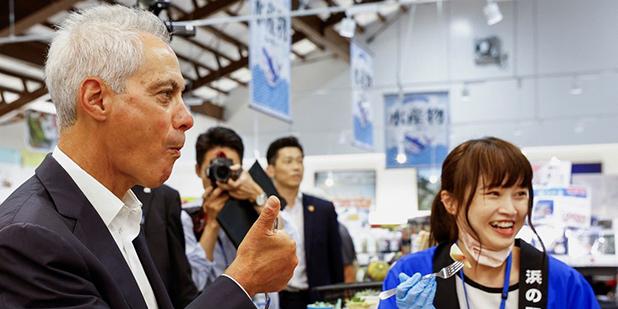Join us for a free one-day workshop for educators at the Japanese American National Museum, hosted by the USC U.S.-China Institute and the National Consortium for Teaching about Asia. This workshop will include a guided tour of the beloved exhibition Common Ground: The Heart of Community, slated to close permanently in January 2025. Following the tour, learn strategies for engaging students in the primary source artifacts, images, and documents found in JANM’s vast collection and discover classroom-ready resources to support teaching and learning about the Japanese American experience.
Educator Workshop: IOKIBE Kaoru on U.S.-Japan Relations
IOKIBE Kaoru (University of Tokyo) will focus on U.S.-Japan relations in historical and contemporary contexts.

Monday, December 4, 2023
4 - 6 pm Pacific Time
Online via Zoom
This workshop is part of our program for K-12 educators. All are welcome to learn more and to sign up here.

Former U.S. Pres. Ulysses S. Grant being entertained in Tokyo's Ueno Park in 1879. TOSHIMITSU Kobayashi 小林年参 woodblock print.

Postcard showing the rebuilt Ginza district in Tokyo, 1930; the recovery after the 1923 Kanto earthquake. The street renamed in honor of the Showa Emperor.

U.S. President Joe Biden and Japan Prime Minister KISHIDA Fumio meet in San Francisco at the Asia Pacific Economic Cooperation summit, Nov. 2023.
 Professor Iokibe has published extensively on Japanese politics and foreign policy. One of his books focused on efforts to restore Japanese sovereignty following the unequal treaties with Western nations in the 19th century. More recently he's published Political History of Deception on how political lies have been challenged.
Professor Iokibe has published extensively on Japanese politics and foreign policy. One of his books focused on efforts to restore Japanese sovereignty following the unequal treaties with Western nations in the 19th century. More recently he's published Political History of Deception on how political lies have been challenged.This workshop is presented in partnership with the Japan Society and the National Consortium for Teaching about Asia. Financial support comes from the Freeman Foundation.
The photo at the top of the page is of U.S. Ambassador to Japan Rahm Emanuel eating sushi in August 2023 to show support for Japan's seafood industry, in the context of Chinese protests against the release of treated wastewater from the defunct Fukushima nuclear power station.
Featured Articles
Please join us for the Grad Mixer! Hosted by USC Annenberg Office of International Affairs, Enjoy food, drink and conversation with fellow students across USC Annenberg. Graduate students from any field are welcome to join, so it is a great opportunity to meet fellow students with IR/foreign policy-related research topics and interests.
RSVP link: https://forms.gle/1zer188RE9dCS6Ho6
Events
Hosted by USC Annenberg Office of International Affairs, enjoy food, drink and conversation with fellow international students.
Join us for an in-person conversation on Thursday, November 7th at 4pm with author David M. Lampton as he discusses his new book, Living U.S.-China Relations: From Cold War to Cold War. The book examines the history of U.S.-China relations across eight U.S. presidential administrations.




